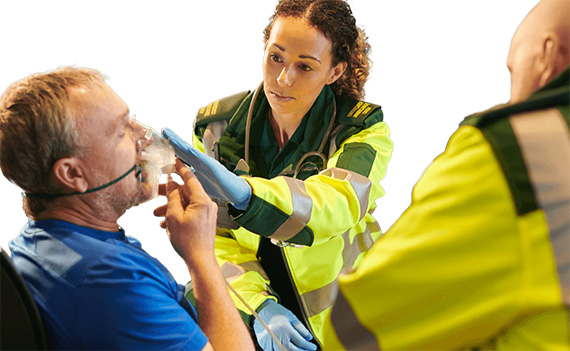QA Level 3 Certificate in First Response Emergency Care (FREC 3)
Delivery methods available:
Face-to-face

Duration
5 Days
Time
Times vary to suit your needs
Cost
£395 (+vat)
Capacity
Max. 6
Upcoming Courses
Please wait, loading live course availability.
FAQs about What is FREC Level 3 Training Courses
What is FREC Level 3 training?
FREC is the abbreviation of First Responder Emergency Care, and the level 3 version of this course forms part of a suite of approved prehospital emergency care qualifications. The syllabus is more advanced than traditional first aid at work and is frequently used as an alternative in high-risk work environments. Upon completion, learners should obtain a level of expertise equivalent to level D of the FPHC Prehospital Emergency Medicine (PHEM) skills framework.
What does a FREC Level 3 course cover?
FREC 3 covers all content required to facilitate the safe and effective provision of prehospital emergency care. The programme has one unit with three mandatory components that learners must complete to achieve the qualification. These components are structured as follows:
Patient assessment and management
- The role and responsibilities of a first responder
- Assessment of an incident
- Evaluation and management of casualties with life-threatening and non-life-threatening illnesses and injuries
- Assessing a patient’s airway
- Managing a patient’s airway
- Managing unresponsive patients who are not breathing normally
- Safe use of an AED during a resuscitation attempt and maintenance requirements
- Administering emergency oxygen
Emergency Trauma (assessing & managing)
- Trauma patients
- Catastrophic bleeding
- Chest injuries
- Bleeding
- Compromised circulation
- Wounds and eye injuries
- Burns or scalds
- Sudden poisoning
- Head, spinal and musculoskeletal injuries
Focused Emergency and Urgent Care
- Identifying and managing a patient experiencing breathing difficulties
- Managing a patient with anaphylaxis
- Assessing and aiding a patient with a suspected major illness
- Managing a patient who is actively convulsing
- Providing emergency care for the effects of environmental exposure
How is FREC Level 3 assessed?
Those who attend this course are assessed on their grasp of prehospital emergency care theory and their ability to apply the practical skills through demonstration. The theory is assessed via a multiple-choice question paper. The learner is given 30 minutes to attain a score of at least 18 out of a maximum of 25 to gain a pass. The practical assessments are divided into three components. The first consists of essential life support, AED, airway, and ventilation management. Component two contains trauma, and finally, three is the treatment of illness.
How long does the course take?
FREC Level 3 involves 35 guided learning hours typically delivered over five full classroom-based days. The awarding body states that the 35 guided learning hours can be divided into shorter bite-sized sessions; however, each must be a minimum of two hours. In addition, it is recommended that learners invest a future 14 hours of private study, which may include reading and research.
Who needs it?
FREC Level 3 can be useful for those working or volunteering in various environments, which commonly include medium to high-risk workplaces or community settings. It is also considered the ideal qualification for those wishing to embark on a career within the emergency services or for independent ambulance service providers. There are no prerequisites to embarking on this course other than being at least 17 years old, so it is an accessible training programme for those who develop their skills and broaden their career horizons.
Why is FREC Level 3 training important?
With the existing pressures on the NHS, the FREC level 3 has never been more critical as it provides a rapid qualification route for those wishing to provide prehospital care. Healthcare professionals are at capacity, and it is often First Responder Emergency Care personnel who are required to give crucial medical support to our communities.
